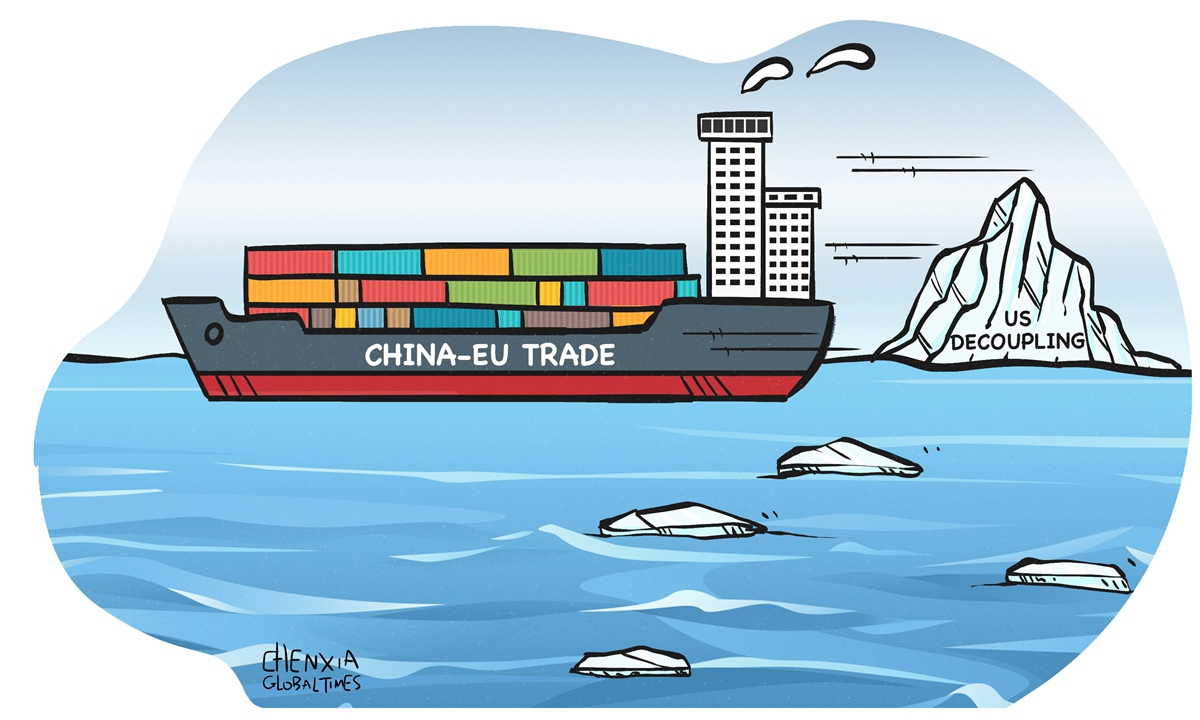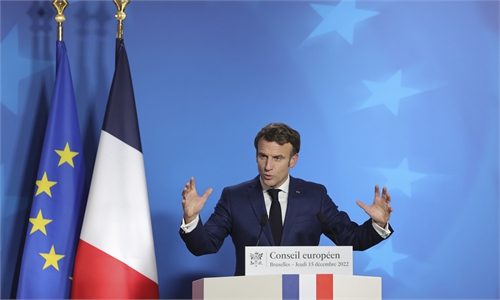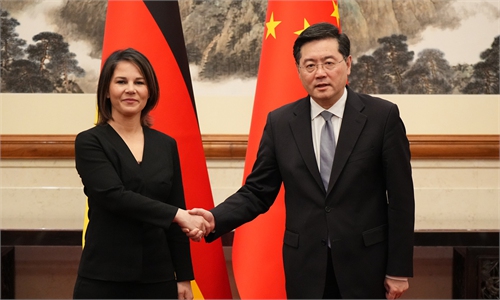
Illustration; Chen Xia/Global Times
Long-standing pragmatic cooperation used to be regarded as the cornerstone of China-EU relations. But right now, normal economic cooperation is being increasingly disrupted by Washington's geopolitical and ideological games. It's positive to see that, following French President Emmanuel Macron's just-concluded trip to China, rational voices underlining China's role as a key trading partner has emerged, creating an atmosphere in which EU officials can take a pragmatic approach to solve practical difficulties. It shouldn't be spoiled by the narrow geopolitical mind-set of some bad faith actors.Spanish Economy Minister Nadia Calvino was quoted by Reuters as saying on April 11 that Europe cannot ignore China's role as a key trading partner. This came after Macron urged Europe to become more committed to achieving "strategic autonomy" so as not to become a "vassal" of a major power amid the global crisis.
After the Russia-Ukraine conflict broke out in early 2022, Europe has become more dependent on the US in terms of geopolitics and security. When Washington is pushing toward this direction from the outside, emphasizing the so-called geopolitical and ideological alliances with Europe, and making human right, supply chain security and the Taiwan question a tool to exert pressure on China, some European leaders' focus on EU's "strategic autonomy" and China's role as a key trading partner can be seen as a refusal to Washington's geopolitical and ideological games. To a certain extent, such rational voices illustrate the great importance European policymakers attach toward balancing diplomacy, pragmatic cooperation, and practical economic issues. The signals are positive.
Currently, amid economic uncertainties caused by sluggish global demand and stubborn inflation, European policymakers should maintain their strategic sobriety and give more priority to fueling economic growth, curbing inflation, and buffering the economic shocks of banking system crises. Now, there is a growing trend in the EU that more rational voices speak up. If further going down in this direction, it will be a blessing to a strong Europe.
European society should remain vigilant to avoid falling in the trap, as the US may use this year's meeting of the G7 foreign ministers as a chance to further promote its geopolitical agenda. The US aims to stir up geopolitical tensions in the region to harass China and to impede China's development.
In a remote address at the start of the meeting of the G7 foreign ministers, EU's foreign policy chief Josep Borrell said on Sunday that relationship between China and Europe will be determined "by Beijing's behavior," including what happens with the Taiwan island, Reuters reported.
We hope that similar voices will not bring Europe back to the previous wrong path that has focused on geopolitical and ideological competition instead of pragmatic cooperation and economic development.
China and EU have broad common interests in economic and trade cooperation. While global trade was dragged down by de-globalization headwind in recent years, China-EU trade and investment have grown steadily. In 2022, China-EU trade increased by 5.6 percent against the trend, and EU investment in China increase by more than 90 percent year-on-year. China is now the EU's second-largest trading partner, largest source of imports, and third-largest export market.
Further deepening pragmatic economic and trade cooperation with China is conducive to the economic prosperity of the EU. With the transformation of China's economic structure, the economic and trade cooperation between China and EU is expected to be further boosted. The Chinese economy is expected to rebound strongly in 2023 from the impact of the epidemic. Promoting the rapid recovery of mutually beneficial economic and trade cooperation with China will inject vitality into the European economy.
Although some Western politicians have not stopped their political interference in mutually beneficial China-EU economic and trade cooperation, market forces are increasingly breaking down these non-economic factors. The New York Times reported on Thursday that even as the US seeks to "decouple" from China, two powerful engines of the German economy - Volkswagen and chemical company BASF - are expanding their investments in China.
European companies have decided to expand in the Chinese market not just because the huge profits from the Chinese market can help them effectively offset the losses caused by economic challenges such as high energy costs in Europe, but also because, as China's economy transforms to be consumption-driven, and China's manufacturing industry upgrades toward high-end, European companies will embrace more opportunities to achieve sustainable growth.
The author is a reporter with the Global Times. bizopinion@globaltimes.com.cn



